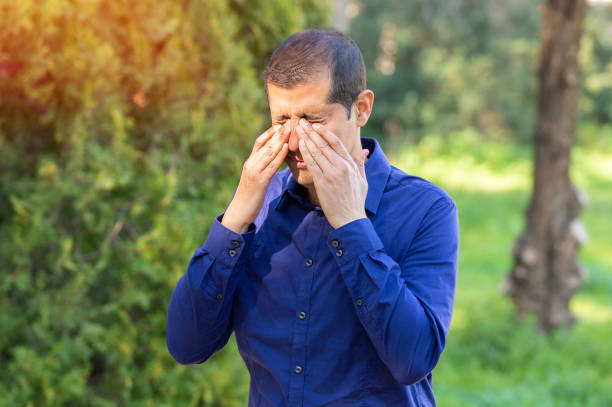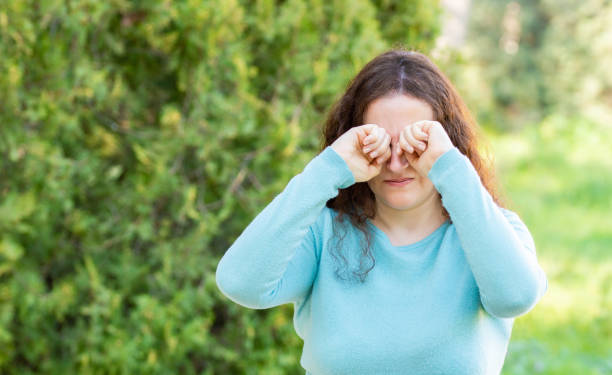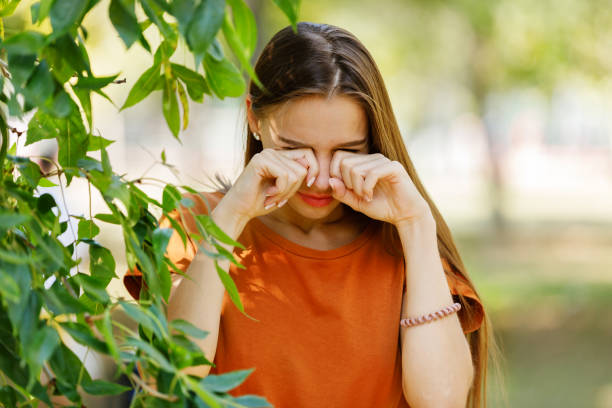Eye allergies are more common than you might think, and they can affect people of all ages. These allergies often show up as red, itchy, watery eyes that make even simple tasks—like reading, driving, or working on a computer—feel uncomfortable. For some, symptoms may come and go with the seasons, while others deal with them year-round due to indoor triggers like dust or pet dander.
While medications such as antihistamines and prescription eye drops are available, not everyone wants to rely on them. Many people prefer safe, natural ways to ease discomfort and protect their eye health without worrying about side effects. The good news is that there are simple, proven natural remedies for eye allergies that actually work and can be used alongside healthy lifestyle habits.
In this post, we’ll break down what eye allergies are, explore the most common triggers, and share the best natural remedies that can give you lasting relief and comfort.
What Are Eye Allergies?
Eye allergies, also called allergic conjunctivitis, happen when your eyes react to everyday substances like pollen, dust, pet dander, or mold. For most people, these particles are harmless, but if you have allergies, your immune system mistakes them for dangerous invaders. To defend your body, it releases histamines and other chemicals. This immune response causes the well-known symptoms of eye allergies, including redness, itching, tearing, and swelling of the eyelids.
Unlike eye infections, which are caused by bacteria or viruses, eye allergies are not contagious. You cannot “catch” them from someone else, but they can still disrupt your routine. Even mild symptoms can make it hard to focus at work, enjoy time outdoors, or get a good night’s sleep. During allergy season, when pollen levels are high, these symptoms often become much worse, leading many people to look for fast and natural relief.

Common Triggers of Eye Allergies
Understanding what triggers your symptoms is the first step to managing eye allergies. When you know the source of your irritation, you can take steps to reduce contact and prevent flare-ups before they start. The most common causes include:
- Pollen: Trees, grass, and weeds release pollen into the air, especially in spring and fall. These tiny grains stick to your hair, skin, and clothes, making your eyes itchy and watery.
- Dust mites: These tiny insects are invisible to the eye but live in bedding, furniture, and carpets. Their waste particles can easily trigger allergic reactions.
- Pet dander: Proteins found in pet saliva, urine, and skin flakes can linger in the air and settle on surfaces, causing eye irritation even after pets leave the room.
- Mold spores: Often found in damp areas like bathrooms, kitchens, or basements, mold releases spores that can irritate sensitive eyes.
- Smoke and pollution: Environmental irritants, such as cigarette smoke, car exhaust, or smog, can make allergy symptoms worse and increase eye dryness.
By identifying your triggers and limiting exposure to them, you can cut down on allergy attacks and reduce the need for constant treatment. Even small changes, like keeping windows closed during high pollen days or using air purifiers at home, can make a big difference in protecting your eyes.
Symptoms of Eye Allergies
Eye allergy symptoms are usually easy to spot. They include:
- Itchy or burning eyes
- Redness and irritation
- Watery or teary eyes
- Swollen eyelids
- Light sensitivity
If you notice these symptoms, chances are you’re dealing with eye allergies rather than an infection.
Natural Remedies for Eye Allergies That Actually Work
When your eyes are itchy and irritated, you want quick relief. While prescription medications can help, natural remedies often work just as well—without side effects.
Here are the best proven natural remedies:
1. Cold Compress for Instant Relief
A cold compress is one of the simplest ways to calm irritated eyes. The cool temperature reduces swelling and itching by narrowing blood vessels.
How to do it:
- Soak a clean washcloth in cold water.
- Place it over your closed eyes for 5–10 minutes.
- Repeat several times a day as needed.
This method is safe, effective, and provides instant relief.
2. Artificial Tears (Lubricating Eye Drops)
Dryness often makes allergy symptoms worse. Artificial tears, available over the counter, help flush out allergens and keep eyes moist.
Look for preservative-free options to avoid further irritation. According to the American Academy of Ophthalmology, artificial tears are safe for daily use.
3. Saline Eye Rinse
Washing allergens out of your eyes can give you quick relief. A sterile saline rinse removes pollen, dust, and dander that cause irritation.
Tip: Always use a sterile solution or pre-made eye wash. Never rinse with tap water, as it may contain harmful microbes.
4. Omega-3 Fatty Acids

Omega-3 fatty acids, found in foods like salmon, flaxseed, and walnuts, can help reduce eye inflammation. Research shows omega-3s support tear production and may ease allergy symptoms.
You can also take fish oil or flaxseed oil supplements, but check with your doctor first.
5. Chamomile Tea Compress
Chamomile has natural anti-inflammatory properties. Using a cooled chamomile tea bag as a compress may help soothe irritated eyes.
How to do it:
- Brew chamomile tea and let the bag cool in the fridge.
- Place the tea bag over your closed eyes for 10 minutes.
This natural method feels relaxing and can reduce redness.
6. Aloe Vera Gel
Aloe vera is known for its soothing effect on skin, but it can also calm eye allergies. When applied around (not inside) the eyes, it reduces swelling and irritation.
Tip: Use pure, organic aloe gel and apply only to the skin around the eyes.
7. Antioxidant-Rich Diet
A diet high in antioxidants can protect your eyes from inflammation and allergic reactions. Foods rich in vitamin C, vitamin E, and zinc support eye health.
Great options include:
- Citrus fruits (oranges, lemons)
- Leafy greens (spinach, kale)
- Nuts and seeds (almonds, sunflower seeds)
- Berries (blueberries, strawberries)
According to the National Eye Institute, a nutrient-rich diet plays a big role in protecting your vision.
8. Stay Hydrated
Drinking plenty of water helps your body flush out allergens and keeps your eyes from drying out. Aim for at least 8 glasses of water a day.
9. Local Honey
Some studies suggest that eating small amounts of local honey may help your body build tolerance to pollen in your area. While research is ongoing, many people report reduced allergy symptoms with regular honey consumption.
10. Manage Indoor Air Quality
Since many allergens are airborne, improving air quality at home can make a huge difference.
Ways to reduce allergens indoors:
- Use a HEPA air purifier in your bedroom.
- Keep windows closed during high pollen days.
- Wash bedding in hot water weekly.
- Vacuum often with a HEPA filter vacuum.

Lifestyle Tips to Prevent Eye Allergies
Natural remedies work best when combined with good habits that lower your exposure to allergens. By making small lifestyle changes, you can prevent flare-ups and keep your eyes more comfortable throughout the day. Here are some simple but effective tips to reduce symptoms:
- Wear sunglasses outdoors: Sunglasses act as a barrier to block pollen, dust, and wind from reaching your eyes. Wraparound styles give even better protection.
- Shower and change clothes after being outside: Pollen and other allergens stick to your hair, skin, and clothing. Rinsing off and putting on clean clothes prevents these particles from spreading indoors.
- Avoid rubbing your eyes: Rubbing may feel soothing at first, but it actually releases more histamines and makes redness, itching, and swelling worse. Instead, use a cold compress for relief.
- Keep pets off bedding and furniture: Pet dander clings to fabrics and can build up in places where you rest or sleep. Keeping pets out of bedrooms and washing their bedding often can help reduce exposure.
- Monitor pollen counts: Check local pollen forecasts before going outside. On high-pollen days, try to stay indoors, especially in the morning when pollen levels are highest.
By combining these habits with natural remedies, you create a strong defense against eye allergies and can enjoy more symptom-free days.
When to See a Doctor
While natural remedies help most people, sometimes medical treatment is necessary. Visit your eye doctor if you experience:
- Severe pain or vision changes
- Symptoms lasting longer than a few weeks
- Yellow or green eye discharge (possible infection)
A doctor can recommend stronger treatments if needed.
Final Thoughts
Eye allergies can make life miserable, but finding relief is possible with the right approach. Constant itching, redness, and watery eyes can interfere with your daily routine, but natural options can help. By using simple remedies like cold compresses, artificial tears, and antioxidant-rich foods, you can soothe your symptoms safely and effectively without heavy reliance on medication. These methods not only calm irritation but also support long-term eye health.
The key to lasting relief is to combine natural remedies with smart lifestyle changes. Avoiding triggers, keeping your home clean, and improving indoor air quality can make a big difference in reducing flare-ups. Small steps, such as using an air purifier, wearing sunglasses outdoors, or washing your bedding often, can protect your eyes from common allergens.
If your symptoms do not improve or become more severe, it’s important to seek professional advice. An eye doctor can rule out other conditions, suggest stronger treatments, and guide you toward a plan that works best for your needs. With the right balance of natural care and healthy habits, you can keep your eyes comfortable and enjoy clearer, irritation-free days.
👉 Have you tried any of these natural remedies for eye allergies? Which one worked best for you? Share your experience in the comments—we’d love to hear from you!

